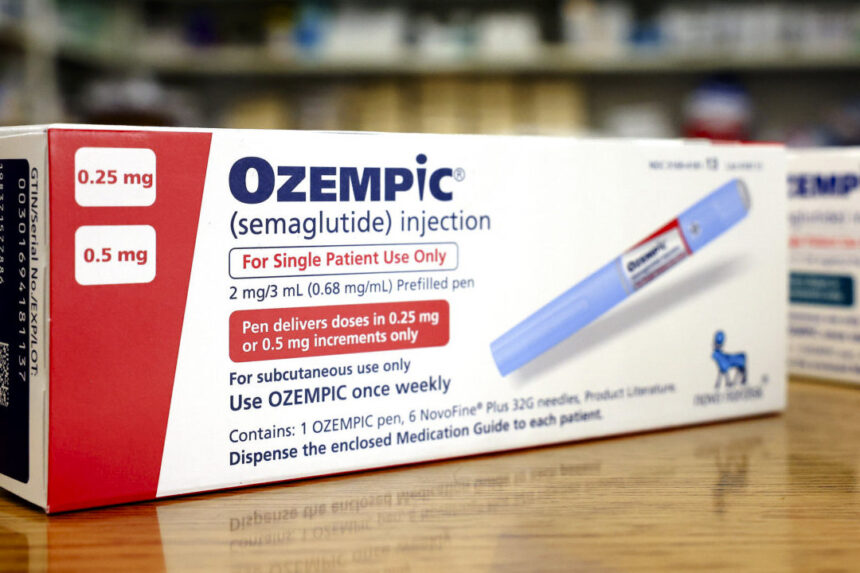Weight loss drugs recommended by the NHS and WHO may have potential unpleasant side effects, according to studies. Genuine weight loss drugs also come with a range of potential side effects.
Pharmacy leaders are warning against purchasing fake weight-loss injections online, as shortages of Ozempic are expected to continue into next year. Ozempic is currently only available on the NHS for individuals with type 2 diabetes, while Wegovy can be prescribed for weight loss through specialist services for those with a BMI over 30 and at least one obesity-related health condition.
Despite this, “skinny jabs” can be easily obtained online, especially through social media platforms, where they are heavily promoted by celebrities and influencers who have shared their weight loss success stories after using the self-injectable drugs.
The National Pharmacy Association (NPA) has raised concerns about a potential increase in the unlicensed sale of medication online, with individuals purchasing Ozempic and Wegovy from unlicensed sellers. UK pharmacists are facing a shortage of Ozempic due to high demand and some doctors privately prescribing it off-label for weight loss.
Sales Expected to Double This Year
Ozempic, originally designed for individuals with type 2 diabetes to manage blood sugar levels, has been repurposed as a weight loss drug due to its appetite-suppressing properties, gaining popularity globally. This has led to a shortage of the drug for diabetes patients and an increase in counterfeit injections that may not contain the necessary active ingredient.
Novo Nordisk is expected to report significant sales for Ozempic and Wegovy in the second quarter of 2024, almost double the sales from the same period in 2023.
The NPA is advising patients to consult their pharmacist or GP rather than buying medications online from unregistered sellers. They also anticipate ongoing difficulties in obtaining Ozempic into the next year.
Nick Kaye, chairman of the NPA, expressed concern about potential unauthorized online sales due to medicine shortages and emphasized the importance of prioritizing limited stocks for those in critical need. He mentioned that while Wegovy stocks are relatively stable, new Ozempic stock is not expected until at least December 27.
In January, the Department of Health and Social Care instructed healthcare providers not to prescribe the drugs off-label for weight loss and to reserve existing stock for diabetes patients. Supply issues are expected to persist until at least the end of 2024 due to increased demand for licensed and off-label use.
Off-Label Prescribing
Kaye highlighted concerns about off-label prescribing and the presence of counterfeit drugs in the supply chain, urging individuals to be cautious when seeking out these medications. The NPA is advocating for the reintroduction of regulations that would make a list of regulated online UK medicine sellers publicly available.
He recommended verifying the registration and regulation of online providers by the General Pharmaceutical Council or Pharmaceutical Society of Northern Ireland. In June, the World Health Organization issued a medical product alert regarding fake semaglutide stocks found in Brazil, the UK, and the US.
While genuine weight loss drugs may have their benefits, they are not without potential side effects.
In the United States, the Food and Drug Administration (FDA) has issued a warning about accidental overdosing on GLP-1 agonists, leading to severe side effects such as nausea, vomiting, headache, exhaustion, dehydration, pancreatitis, and gallstones.
Many users have taken to social media to share their experiences with undesirable side effects, including cosmetic issues like slackened skin and “Ozempic face.” It is recommended to start with the lowest dose of the drug and increase as needed.
The Department of Health and Social Care advises against purchasing regulated medicines from unauthorized online retailers or beauty salons due to potential dangers. The Medicines and Healthcare products Regulatory Agency (MHRA) is actively working to crack down on illegal trading of medicines to protect public health.
Efforts are also being made to address the obesity crisis by focusing on prevention to reduce the burden on the NHS and promote healthier lifestyles. The MHRA recently approved the use of Wegovy to help obese adults lower their risk of heart problems and strokes.
A study at Imperial College, London, suggested that Wegovy could also have potential benefits in preventing dementia, though further research is needed to confirm these initial findings. Overall, these developments highlight the importance of safe and responsible medication use.
*PA Media contributed to this report*
Source link




